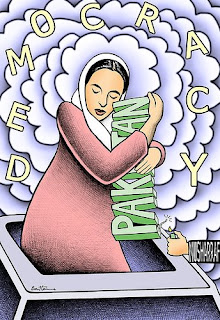
The Great Game is a term used to describe the 19th century struggles between the British and Russian Empires for supremacy in Central Asia. It’s henceforth been a term that also tends to get thrown around anytime Russia butts heads with a Western power over territory in Central Asia. It happens to be a great day to revisit the Great Game.
Last week, Kyrgyz President Kurmanbek Bakiyev announced in Moscow that Kyrgyzstan will discontinue U.S. access to an air base that is key to military operations in Afghanistan. Why did he make this announcement from Russia? Well, because he had just finished a meeting where Russian President Medvedev pledged to lend Kyrgyzstan $2 billion, write off $180 million in debt, and add another $150 million in aid.
Where to begin? No one wins the Great Game. The base in Kyrgyzstan is currently the only good US access point to Afghanistan, as the Uzbekistani government stopped allowing US operations back in 2005. This will drastically affect the war on terrorism right as the Obama administration was preparing to deploy as many as 30,000 additional troops to Afghanistan this week. Oops.
Moreover, the Kyrgyz sanctioned US use of the base was really the last show of any good relations between the Kyrgyz Republic and the US. Since Kyrgyzstan’s Tulip Revolution in 2005, freedom and human rights have not taken off as the West would have hoped. The country is increasingly turning to its closer neighbor - Russia - for support. Now with this large fiscal promise from Medvedev, the Central Asian country is sure to back slide even further away from the goals of the color revolutions.
Sounds bad? It gets worse. Russia is angling for leverage in running the war on terrorism on its own terms, but she is in no position to make these promises of loans and aid. If history is any indication, Russia is now setting a precedent. It cannot follow through on similar promises to the other Central Asian nations, but will certainly have to go through the motions. Unless the economy hits a dramatic up-turn, Russia is setting itself up to fail.
And the big loser in the Great Game? Well, that continues to be the people of Central Asia. Human rights, independent media, and basic freedoms will continue to decline. The initial capital from Russia will most likely boost a number of government programs, but nothing will be sustained. My advice? We’re all better off playing Risk.
Last week, Kyrgyz President Kurmanbek Bakiyev announced in Moscow that Kyrgyzstan will discontinue U.S. access to an air base that is key to military operations in Afghanistan. Why did he make this announcement from Russia? Well, because he had just finished a meeting where Russian President Medvedev pledged to lend Kyrgyzstan $2 billion, write off $180 million in debt, and add another $150 million in aid.
Where to begin? No one wins the Great Game. The base in Kyrgyzstan is currently the only good US access point to Afghanistan, as the Uzbekistani government stopped allowing US operations back in 2005. This will drastically affect the war on terrorism right as the Obama administration was preparing to deploy as many as 30,000 additional troops to Afghanistan this week. Oops.
Moreover, the Kyrgyz sanctioned US use of the base was really the last show of any good relations between the Kyrgyz Republic and the US. Since Kyrgyzstan’s Tulip Revolution in 2005, freedom and human rights have not taken off as the West would have hoped. The country is increasingly turning to its closer neighbor - Russia - for support. Now with this large fiscal promise from Medvedev, the Central Asian country is sure to back slide even further away from the goals of the color revolutions.
Sounds bad? It gets worse. Russia is angling for leverage in running the war on terrorism on its own terms, but she is in no position to make these promises of loans and aid. If history is any indication, Russia is now setting a precedent. It cannot follow through on similar promises to the other Central Asian nations, but will certainly have to go through the motions. Unless the economy hits a dramatic up-turn, Russia is setting itself up to fail.
And the big loser in the Great Game? Well, that continues to be the people of Central Asia. Human rights, independent media, and basic freedoms will continue to decline. The initial capital from Russia will most likely boost a number of government programs, but nothing will be sustained. My advice? We’re all better off playing Risk.
(Photo via markusbc)











